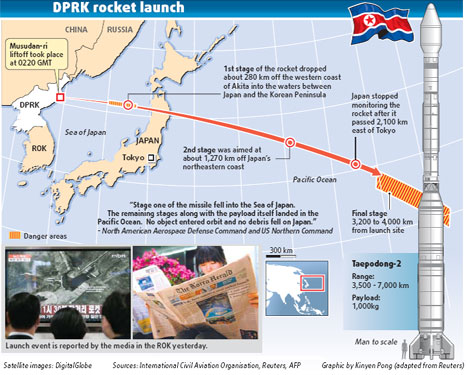
|
WORLD> Asia-Pacific
 |
|
Satellite launch sparks conflicting claims
By Wang Linyan (China Daily)
Updated: 2009-04-06 08:34 The Democratic People's Republic of Korea (DPRK) said on Sunday it launched a satellite into orbit which was circling the Earth transmitting songs - but the United States and the Republic of Korea (ROK) said it had failed to enter orbit.
 The "Taepodong-2" rocket was launched at 11:20 am local time (0220 GMT) from the East Sea Launch Ground in the east coast of the country, the DPRK's Korean Central News Agency said.
But North American Aerospace Defense Command (NORAD) and US Northern Command officials issued a statement disputing any success. "Stage one of the missile fell into the Sea of Japan," the statement said. "The remaining stages along with the payload itself landed in the Pacific Ocean. No object entered orbit and no debris fell on Japan." ROK Defense Minister Lee Sang-hee said that Seoul had judged that the DPRK had failed to put its satellite launched into orbit, Japan's Kyodo news agency reported. "Based on our judgment made so far, all first, second and third (stage) rockets fell into the ocean, and thus nothing has been put into orbit," Kyodo quoted Lee as telling a parliamentary session in Seoul. US, ROK and Japanese officials - who monitored the launch from nearby warships and high-resolution spy satellite cameras - have said they suspect the DPRK was testing long-range ballistic missile technology that could be used to carry a nuclear warhead to Alaska or beyond.
The US insisted it was a missile launch, but the ROK, in a U-turn, said it was a satellite. Japan used "flying object" to describe it. As the US, the European Union, the ROK and Japan denounced the launch, China called for the international community to "stay calm and exercise restraint". Beijing wants to resolve the issue through dialogue and "is opposed to any act that is likely to stoke tensions", Foreign Minister Yang Jiechi said in a statement. He called his counterparts in the US, Russia, Japan and the ROK Sunday after the launch. Yang appealed for the resumption of Six-Party Talks - which were adjourned in February because of disagreement on how to verify Pyongyang's nuclear reports. Russia shared a similar stance. "We are checking whether this is a violation of certain resolutions of the UN Security Council and call on all sides to refrain from actions that could lead to escalation of tensions on the Korean Peninsula," a Russian Foreign Ministry spokesman said.
US President Barack Obama, describing the launch as "provocative", said in the Czech Republic that the DPRK "has ignored its international obligations, rejected unequivocal calls for restraint, and further isolated itself from the community of nations". He was informed of the launch by an aide as he was addressing a crowd in Prague, when he committed himself to reducing the US nuclear arsenal. He said the DPRK "broke the rules once more by testing a rocket that could be used for a long range missile". "This provocation underscores the need for action - not just this afternoon at the UN Security Council, but in our determination to prevent the spread of these weapons". The ROK branded the launch a "reckless" act, Japan said it was "extremely regrettable" and the European Union condemned Pyongyang's step.
The UN Security Council was to hold an emergency meeting Sunday (early morning, Beijing time). UN diplomats said no country was considering imposing new sanctions but a resolution on stricter enforcement of earlier measures could be discussed. The US, Japan and ROK see the launch as a violation of a Security Council resolution passed in 2006 after Pyongyang's nuclear test and other missile tests. That resolution, number 1718, demands the DPRK "suspend all activities related to its ballistic missile program". Chinese analysts said the launch would complicate the situation on the Korean Peninsula. By launching the satellite, the DPRK wants to attract the attention of the US - which is busy fighting domestic economic woes - and force Washington to the negotiating table, said Jin Canrong, associate dean at the School of International Studies at Renmin University of China. But "the move will diminish trust between the DPRK and the US, Japan and the ROK", he added. "It's a test for China", because it will make it harder for Beijing to mediate with all parties, he said. Domestically, Pyongyang needed such a launch to raise the morale of the people, Jin said. Shi Yinhong, Jin's fellow researcher, said the hype of the launch by Japan and the US was to create an excuse for their military expansion in the region. "They play up the 'DPRK threat' to pave the way for building a ballistic defense system," he said during a webchat Sunday. Song Xiaojun, a military expert, said the launch would present the DPRK greater bargaining power in negotiations with other countries. Agencies contributed to the story |